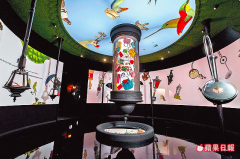Drink doves to quench thirst! Yunnan's "high-end" instant coffee drinks attempt to seize the domestic coffee market

For professional baristas, please follow the coffee workshop (Wechat official account cafe_style)
Not long ago, China's local coffee brand Yunnan Xinruike's new instant coffee "Mata Star" was listed in Guangzhou. It is reported that at present, Xinruike Mata Star series of new products have been put on sale in many first-tier retail supermarkets.
According to statistics, the annual growth rate of China's coffee consumption is about 25%, which is much higher than the global growth rate of 2%. After 2018, China's coffee is bound to enter the fifth stage, and China's coffee consumption is bound to usher in a blowout era. China is increasingly becoming one of the largest emerging consumers of coffee in the world. Xiong Xiangren, president of Yunnan Coffee Association and head of China's well-known coffee enterprises, said in an interview with reporters during the 26th World Coffee Science Congress.
"although China's coffee market is still in its infancy, the number of young Chinese who like to drink coffee is increasing day by day. At present, China's coffee market is growing at an annual rate of 25 per cent, reaching 70 billion in 2015," said Alexander Tietze, a German listing broker. China can be called the most potential coffee seller in the world. According to statistics, as of the beginning of last year, the planting area of coffee in China exceeded 1.8 million mu, with a total output of 140000 tons, accounting for 1.5% of the total global output. Unfortunately, most of it is only used to make instant coffee.
"people's demand for instant coffee is mostly refreshing, and those who really love coffee will not choose instant coffee, but higher-grade coffee beans to make their own." Qin Lang, head of the China Enterprise Network department, said.
In addition, with the improvement of people's living standards, ground coffee has gradually become the mainstream drink among white-collar workers. According to Starbucks' latest five-year Plan, Starbucks will open 5000 stores in China by 2021, all of which will be launched in second-and third-tier cities because they are relatively saturated in first-tier cities. this also seems to show that Starbucks is optimistic about the development of freshly ground coffee in the Chinese market.
In addition to the traditional Starbucks coffee, foreign fast food such as McDonald's and KFC are also aimed at the coffee market. Although it is not freshly ground coffee, it seems reasonable for people to enjoy a cup of strong coffee at the same time.
In addition, more and more enterprises are involved in coffee drinks. Last year, Starbucks Coffee Company and Kang Shifu Holdings Co., Ltd. announced the signing of a formal cooperation agreement to produce Chinese mainland ready-to-drink drinks and expand distribution channels in the local market, which also had a big impact on instant coffee.
Qin Ra said that instant coffee is facing internal and external difficulties, not only Nestle, but also other brands. With the improvement of domestic living standards, drinks gradually show a high-end trend, people are willing to spend more money to get better service and better taste. In the coming period of time, high-end will gradually erode the low-end market, of course, this does not mean that low-end products will fail, but at least it will not be as easy as it used to be.
Under the current torrent of development of the coffee market, which is "grinding the way and giving priority to high-quality products", domestic coffee brands even want to make money by selling instant development. I have to say that this is drinking doves to quench thirst. The most ironic thing is that even the cheapest instant coffee with the worst experience quality dares to call itself "high-end" coffee, which is quite shameless.
Important Notice :
前街咖啡 FrontStreet Coffee has moved to new addredd:
FrontStreet Coffee Address: 315,Donghua East Road,GuangZhou
Tel:020 38364473
- Prev

Analysis of the key factors of coffee bean aroma and grinding!
Professional barista Communication follow coffee drinkers in the coffee workshop (official Wechat account cafe_style) have you noticed that there is a smell of coffee coming out of the grinder when the coffee beans are ground into powder? Or is it the smell of coffee squeezed from fresh coffee beans packed with coffee exhaust valve bags? In fact, fresh coffee beans can breathe, through the hairs on the surface of coffee beans.
- Next

HERM è S Taipei launches a copy of Paris Life Circle Coffee to visit Dog Night Club
Professional baristas Please follow the Coffee Workshop (official Wechat account cafe_style) even if you get lost in Paris, every unexpected corner looks like an unknown surprise, waiting to be discovered. Walking without a default goal should be the best way to experience everyday Paris. The HERMES (Herm è s) Wonderland roaming Exhibition in Taipei today starts with a French stroll.
Related
- What is the difference between Indonesian Sumatra Mantinin coffee and gold Mantinin? How to distinguish between real and fake golden Mantelin coffee?
- What does bypass mean in coffee? Why can hand-brewed coffee and water make it better?
- Unexpected! Ruixing Telunsu lattes use a smoothie machine to foam milk?!
- % Arabia's first store in Henan opens into the village?! Netizen: Thought it was P's
- Does an authentic standard mocha coffee recipe use chocolate sauce or powder? Mocha Latte/Dirty Coffee/Salty Mocha Coffee Recipe Share!
- What is the difference between Vietnam egg coffee and Norway egg coffee? Hand-brewed single product coffee filter paper filter cloth filter flat solution!
- What is the difference between sun-cured and honey-treated coffee? What are the differences in the flavor characteristics of sun-honey coffee?
- How to make Italian latte! How much milk does a standard latte use/what should the ratio of coffee to milk be?
- How to make butter American/butter latte/butter Dirty coffee? Is hand-brewed coffee good with butter?
- Is Dirty the cold version of Australian White? What is the difference between dirty coffee/decent coffee and Australian white espresso?

